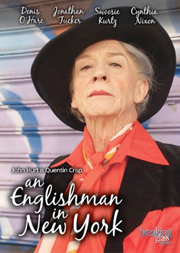Hurt So Good
 Years after his acclaimed portrayal of Quentin Crisp, John Hurt revisits his cinematic alter ego in ‘An Englishman in New York.’
Years after his acclaimed portrayal of Quentin Crisp, John Hurt revisits his cinematic alter ego in ‘An Englishman in New York.’
by Steven Foster
Whether unrecognizable beneath layers of prosthetics in David Lynch’s elegantly heartbreaking The Elephant Man, or dandified with fedora, scarf, and makeup in The Naked Civil Servant, John Hurt is an unsung master at disappearance. His portrayals of famous outsiders-turned-interlopers are the kind of tour de force so delicate they could shame the nominated Streep-and-Sandra combo of this year’s Oscars (worthy performances though they both may be).
Now Hurt has revisited his Servant portrayal of flaming firebrand Quentin Crisp some 25 years later, in An Englishman in New York (Breaking Glass Pictures, breakingglasspictures.com), and the results are thoughtfully rewarding.
The film breezily begins with Crisp summoned stateside to take a bite of the Big Apple with those acerbic, crooked English teeth of his. Once an outcast in his own land, his now-graying, foppish persona charms and impresses the oh-so-mod New Yorkers. Quickly, his agent (the splendid Swoosie Kurtz) scorches the phone lines, setting pages and airwaves ablaze, pitching her new pet author’s pithy bon mots. And for the most part, Crisp’s cleverly honest but skewed view finds a willing audience, whether he’s dishing dirt to a black caller on a reggae radio show, or chatting to a crowd of urbanites who, with a few vocal exceptions, hail and praise him for his non-Eric Sevareid-style newsspeak. His comments on the times are elder-statesmanlike, but also ersatz.
This off-Broadway banter brought stellar success for years—that is, until AIDS hit town and Crisp most famously let loose the quote heard ’round the world: “AIDS is nothing more than a fad.” The backlash against the limpwristed darling was swift and immediate, incessant and incendiary. After feeling the heat, Crisp relents weakly that he would “explain” what he meant by the remark, but his editor (Broadway staple Denis O’Hare) flatly tells him that papers don’t print explanations, they print retractions. Director Richard Laxton handles the scenes of these years with tender distraction by focusing on Crisp’s newfound friendship with sexually self-destructive painter Patrick Anger, played by Jonathan Tucker.
But after the first Bush, the Careening Clinton years, and impending rise of old Georgie Boy, it’s time for bygones to be bygones. And Quentin is dragged out for his final act as cultural provacateur by perfomance artist Penny Arcade, played with fizzy bohemian panache by Cynthia Nixon. Arcade virtually rescued Crisp from potential obscurity, and Hurt and Nixon’s scenes together glow with mutual affection (Nixon’s dialog on gay consumerism is written with wonderful shame-shame-on-us smarts, and she delivers with relish).
The picture doesn’t flinch from Crisp’s missteps, nor does it dwell unnecessarily on his strange stubbornness. But its real success is showing how a boy who wore makeup and got his ass kicked, with the right fortitude and spirit, can land smack dab in the middle of the cultural zeitgeist well into his golden years. Hurt’s performance definitely achieves that.
Steven Foster interviewed Henry Rollins for the February issue of OutSmart magazine.











FB Comments